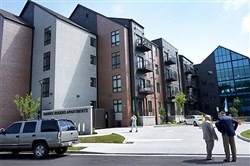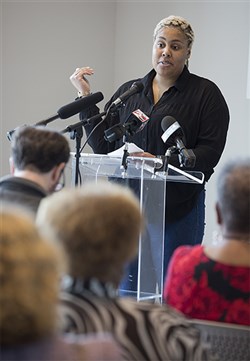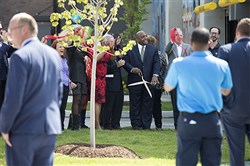VOL. 46 | NO. 23 | Friday, June 10, 2022
$1,730 per month for 1-bedroom apartment
By Kathleen Carlson
The online listing for a two-bedroom, two-bath condo in Green Hills went up on a Thursday, complete with plenty of color photos, even though it won’t be available until September.
Two days later, Tamara Graham was sorting through more than 50 responses, including some from out-of-towners willing to rent sight unseen.
“This is more than I’ve ever had,” she says. Graham and her husband are small investors who rent out five one- and two-bedroom Nashville condos.
Across town in Bellevue, Karen Hardin was packing her belongings and preparing to move from her apartment. She liked the one-bedroom, one-bath apartment unit with a balcony, a wood-burning fireplace and a large walk-in closet and had lived there 14 years.
Monthly rent that started at $624 in 2008 and had gradually increased, as expected. This spring, however, she learned that the price of another year’s lease would be 50% higher rent.
Hardin, 60 and on disability, was shocked. “I understand the landlord’s side,” she says. “They’ve bought the property” and want a return on their investment.
She says she probably will move in temporarily with family until she can find another place. She also is considering finding a roommate.
Welcome to the tug of war between supply and demand for Nashville rental property. The price of renting in and around Nashville has jumped in the past year as more people move here and the pace of construction slows due to labor and supply shortages. Renters often compete with aspiring homeowners and real estate investors for a place to live.

The newly opened Randee Rogers Apartments in the Germantown area is a 100-unit mixed-income Development.
-- Photo By Michelle Morrow |The LedgerMany Nashville tenants have had help paying rent from friends and families, through pandemic relief measures or through government agencies. The Metropolitan Housing and Development Agency (MDHA) rents about 6,500 housing units to eligible families and funnels federal vouchers to about 7,000 other families to supplement what they can afford to pay in rent, as set by a federal formula.
Otherwise, few are insulated from increasing rents.
For example, the Zumper online marketplace for landlords and tenants reports Nashville is among the nation’s 20 most-expensive rental housing markets. Median rent on a one-bedroom Nashville apartment rose 36% from 2021 to 2022, reaching $1,730 a month, Zumper reports. Median rent on a two-bedroom place is $1,800 here, it adds.
Rent at Graham’s condo is $1,850.
The Washington Post reported this spring that rents rose nationally 11.3% last year and continued to rise in the first months of 2022. The Post used estimates from CoStar, a commercial real estate information company, that projected rents to rise by 6% nationwide in 2022.
Higher rents and shortages of apartments hit those with lower incomes the hardest. Nashville’s Affordable Housing Task Force reported a deficit of affordable rental options for people making up to 80% of area median income (AMI).
For a Nashville family of four, 80% of AMI comes out to $67,450, the report stated when issued a year ago. For reference, Metro police and firefighters earn a starting salary of just over $43,000 under the Fiscal Year 2022 pay tables available online.

Jowaune Mckenzie shares her joy on the balcony of her new apartment.
-- Photo By Michelle Morrow |The LedgerMoreover, the National Low Income Housing Coalition (NLIHC) reports there’s no state with enough affordable homes available for extremely low-income renters. There are more than 233,000 such households in Tennessee, NLIHC states, and a shortage of more than 127,000 affordable and available rentals.
The maximum annual income for an extremely low-income Tennessee family of four is $26,200. For every 100 extremely low-income households in Tennessee, there are 46 affordable and available rental homes, NLIHC reports. The gap between demand and supply is smallest in West Virginia, with 61 units per 100 households.
In Nashville, MDHA serves about 30,000 people in more than 13,000 families, MDHA Director of Communications Jamie Berry says. MDHA, established in 1938, also manages federally funded community development and homeless assistance programs on behalf of Metro government.
To foster urban growth, the agency oversees 11 redevelopment districts that guide development through design and land-use zoning controls, a recent MDHA news release says.
The number of landlords accepting Section 8 vouchers that about 7,000 Nashville families use has begun to inch up. There were 699 Section 8 landlords at the end of 2020 and 725 participated as of May 23, Berry says. By comparison, there were 1,100-plus Section 8 landlords in 2014, according to MDHA annual reports.
Berry says the number has fallen “because the Nashville market has changed drastically since then, and landlords can charge more rent for their units.
“Our payment standards are based off of fair market rents published by (HUD), and they aren’t always competitive with current Nashville market rents,” she says. “We also have landlords who have sold their units/properties because of the increase in property values.”

Jowaune Mckenzie, 30, shares about her journey leading to this day as a proud resident in the new Randee Rogers Apartments.
-- Photo By Michelle Morrow |The LedgerMDHA also is helping build apartments, adding 679 units since 2017. They include mixed-income developments, affordable housing developments and workforce developments. Affordable housing is for families with an adjusted income 80% and below of the Area Median Income (AMI). Workforce housing includes families earning between 80% and 120% of the AMI.
Just last week, MDHA hosted a grand opening for its newest mixed-income development, the Randee Rogers Apartments at 1419 Rosa L. Parks Boulevard, close to Germantown, downtown Nashville and Metro Center. The 100 apartments include one-, two- and three-bedroom units and offer Whirlpool appliances, quartz countertops, walk-in closets, a fitness room, community room, parking garage and computer lab. Half of the units are subsidized/affordable, MDHA said in a news release.
Jowaune McKenzie moved into her one-bedroom apartment last month. She told attendees at the grand opening, “I love my new home, and I especially love my downtown view from my balcony.”
Talking later in the week, she said her new place is comfy and she has more room. The neighborhood is lively and a short drive to work from the parking garage. “It’s really quiet so far,” she added.
The apartments were built on land that MDHA already owned and had used as a training center. Using MDHA land helped hold down the cost of building the apartments, one way to foster development of affordable rental units. But the shortage takes time to remedy.

MDHA Executive Director Troy D. White, Ph.D., cuts the ribbon on the new Randee Rogers Apartments.
-- Photo By Michelle Morrow |The LedgerIt can take three to four years or more for an apartment project to go from idea to reality, says Martin Heflin, a Nashville real estate developer and adjunct professor of real estate finance at Vanderbilt’s Owen Graduate School of Management, where he directs its real estate coursework. He is president of Nashville’s Verta Development, which is building Meridian Park, a 158-unit apartment community in East Nashville.
Verta bought the land for Meridian Park from another company, then spent about 16-18 months seeking zoning changes to allow a multifamily rental development. Designing the project and securing the approvals to begin construction took another year.
Heflin said construction is “rolling into 24 months with another three months to go” before tenants can begin to move in. Similar construction used to take 18 months.
The long lead time on multifamily developments, coupled with a continuing influx of newcomers to the area, has exacerbated the mismatch between supply of rental properties and the demand for them, which in turn has kept pushing rents ever upward.
“We need more (housing) and at all levels,” Heflin says. People will continue to move farther and farther away, without the rail infrastructure or bus rapid transit in place to shuttle them from home to job.
“Over the next few years, anyone’s guess (on where the market will go) is as good as mine. I think the pace (of increasing rents) is going to have to slow.”
Nashville’s infrastructure could be “one of the factors (that are going to) negatively impact us on growth,” Heflin notes. “I think we’re on a fantastic trajectory but there are cracks in the armor that we need to take a look at.”
Nashville also needs to examine its utility infrastructure, particularly the water system. “There are a lot of old pipes in the ground,” Heflin says.” Consequently, water flow may not have enough pressure to reach the fifth floor of a five-story building, without the developer having to add water pumps to the property.
Meanwhile, people continue to move to Nashville.
Using information from the U.S. Census Bureau, the Nashville Area Chamber of Commerce estimates Nashville MSA had a net in-migration of about 13,234 people during 2020 and 2021, says Karl Houston, the Chamber’s vice president of marketing and communications. That translates to about 36 people moving a day to the Nashville region for that time period, he explains. That’s fewer than the number of people moving here about five years ago, but still a high number.
The Nashville MSA includes Davidson County plus 13 others: Cannon, Cheatham, Dickson, Hickman, Macon, Maury, Robertson, Rutherford, Smith, Sumner, Trousdale, Williamson and Wilson.
More than half of the newcomers came from the Chicago, Los Angeles and New York areas, Houston says.
Early last month, Metro Council approved a program of tax abatements to encourage developers building apartments in Nashville to include affordable units in new complexes. Developers receive tax abatements for offering affordable units in 20% to 40% of the units in the complex. The more affordable the rent, the greater the abatement.
The goal is to increase affordable housing for people making 50%-70% of area median income. The tax abatement would be spread out over 15 years, with an option to renew for another 15. Developers would receive a full tax abatement for the first 10 years, with 20% reductions in each of the last five years.
Tennessee cities, including Nashville, are barred by state law from using anything other than voluntary incentives to encourage developers to build affordable units. Since 1996, Tennessee law also has prohibited local rent-control measures. Local governments can still own and offer public housing at below-market rates.
Vanderbilt’s Heflin says apartments can be profitable even if they’re modest in comparison to some of the top-of-the-line complexes seen these days. Ceilings don’t have to be nine or 10 feet high, and countertops don’t have to be quartz. But it’s hard to build a relatively modest development in Nashville, he says, because it’s a rising market in which land pricing and construction costs are rapidly escalating.
“I’m one of the lucky ones” Hardin says because she can temporarily stay with family until she finds another place. “I do have that cushion.”
But the rent increase has brought stress and mental anguish, she says. She has considered living pretty much anywhere from the Kentucky state line to the border with Alabama, but says she needs to stay near Bellevue to help care for her elderly mother.
Graham, the small investor who had 50 people respond to an ad for the two-bedroom condo, focused on four potential renters and chose one. Then, someone else called to ask if she was the owner (yes) and if she was advertising on Facebook (no).
Someone had appropriated all the photographs she had originally posted, along with the address and other information, and asked for a $1,350 deposit on a condo they didn’t own. Graham immediately notified Facebook, which removed the ad.
Her online ads now state the property is only available through specific sites and to beware of scammers.
“People desperate for housing will go to great lengths to find it,” she says, “and this experience taught us that it’s important for us to help make sure people know how to protect themselves.”